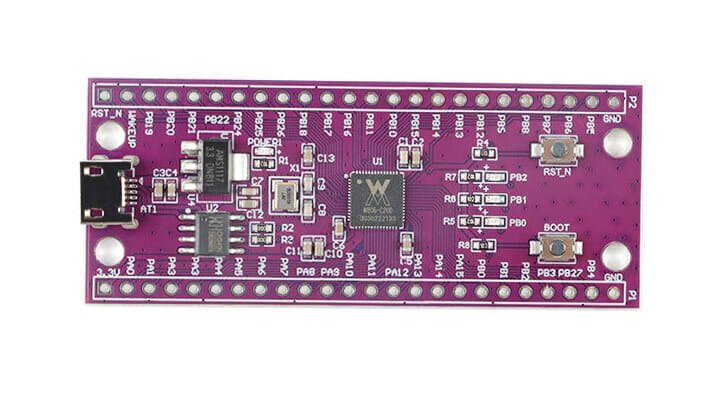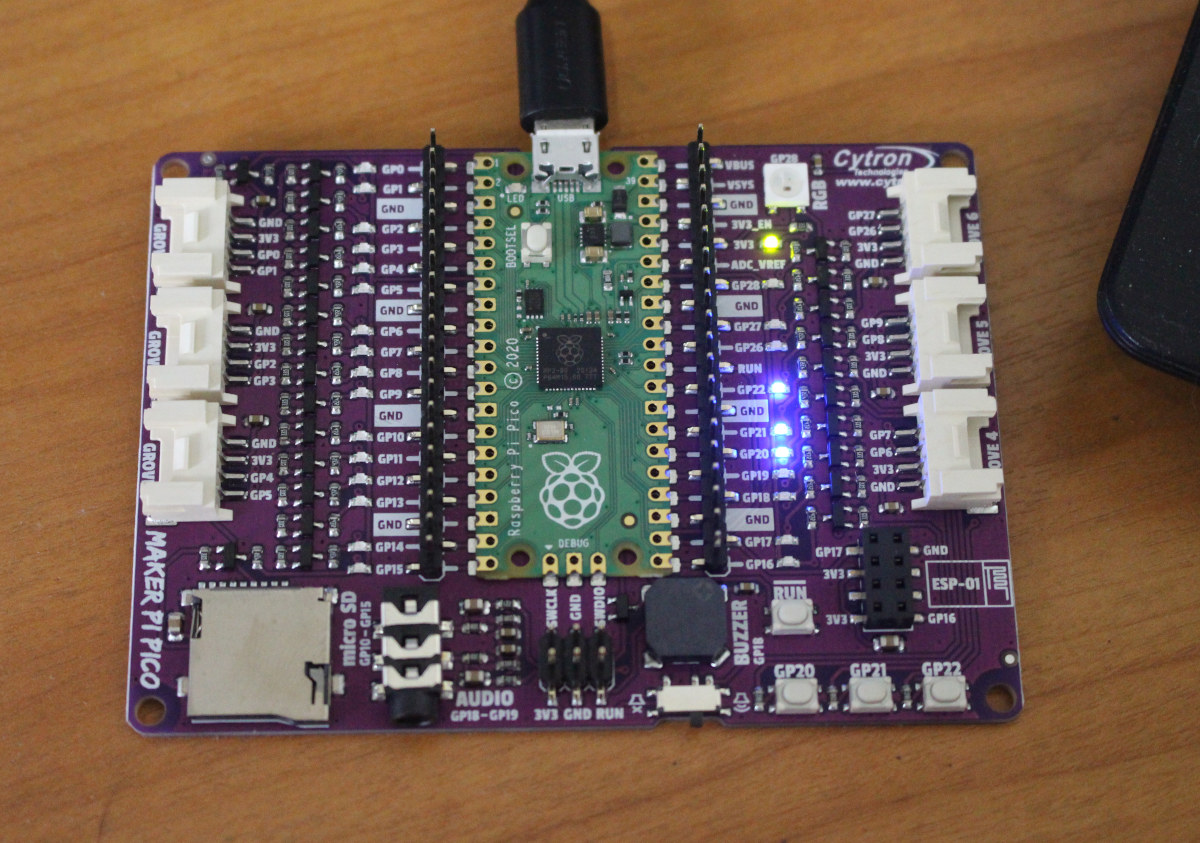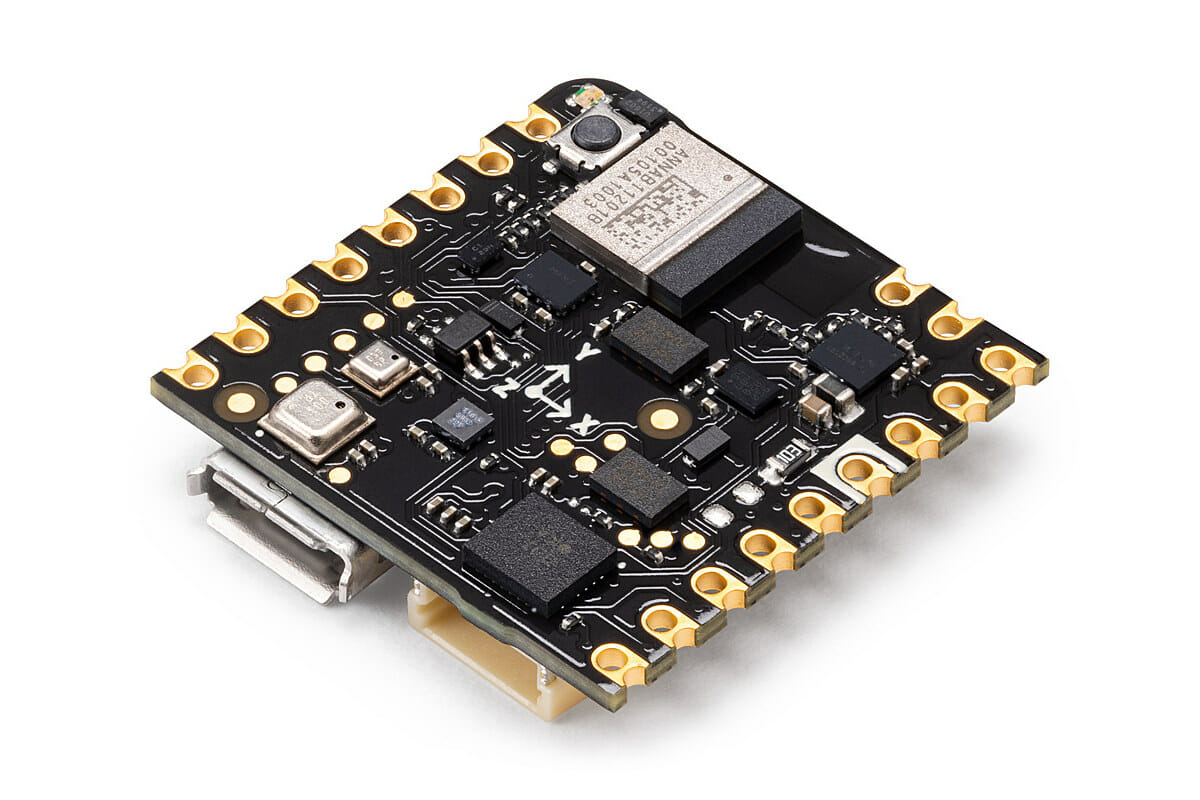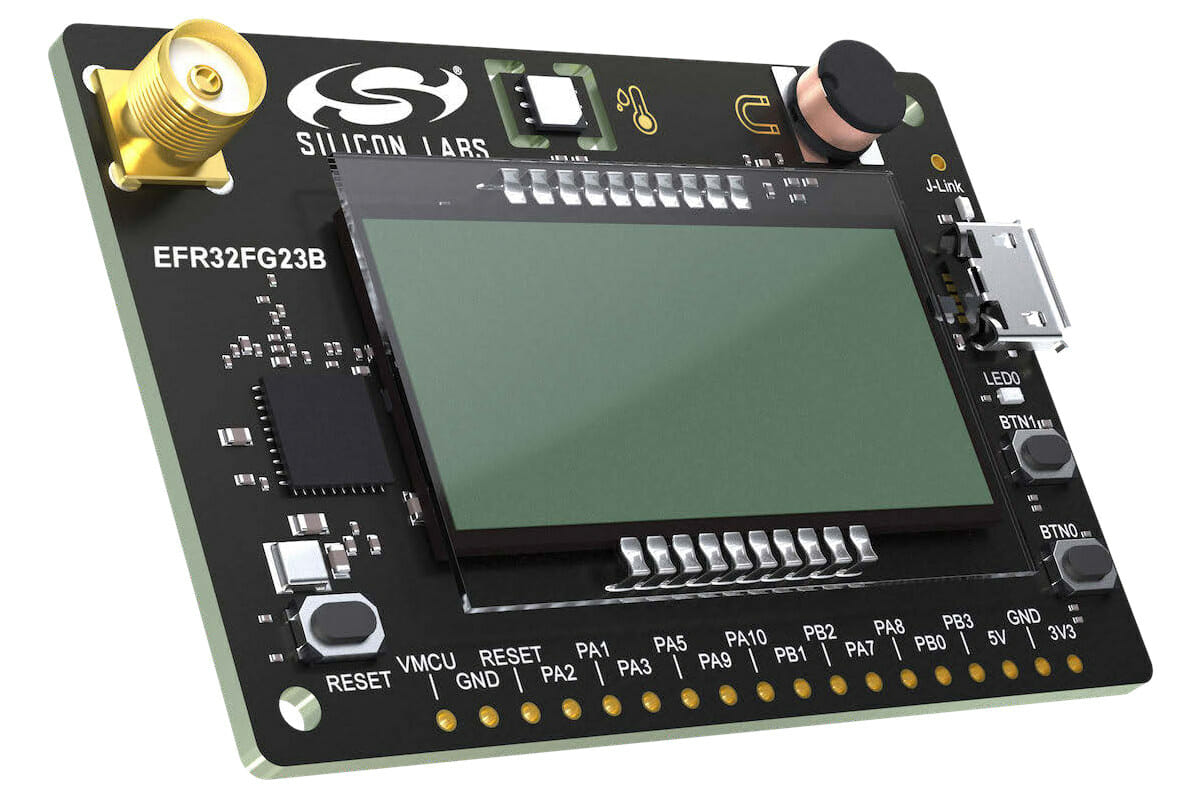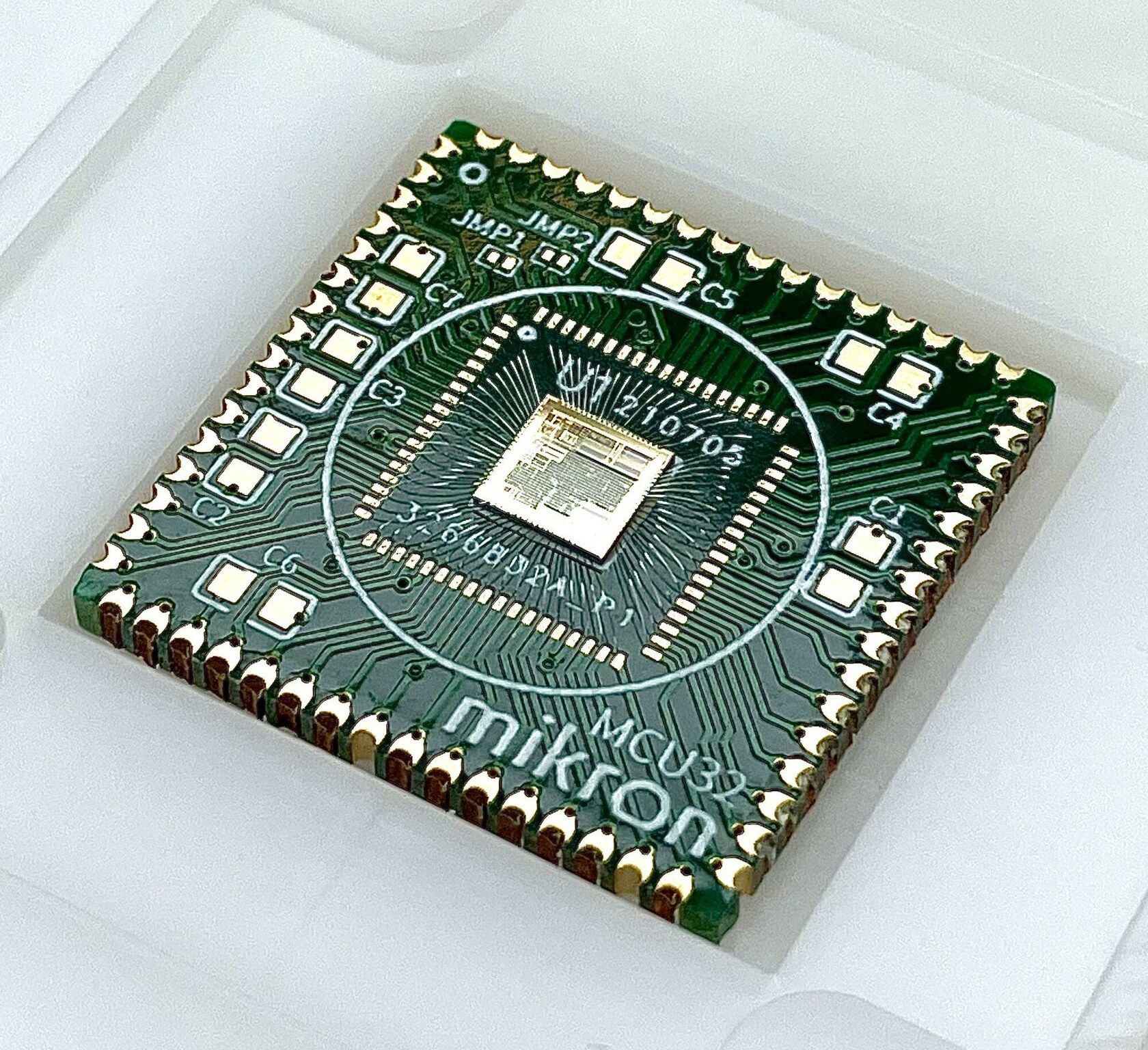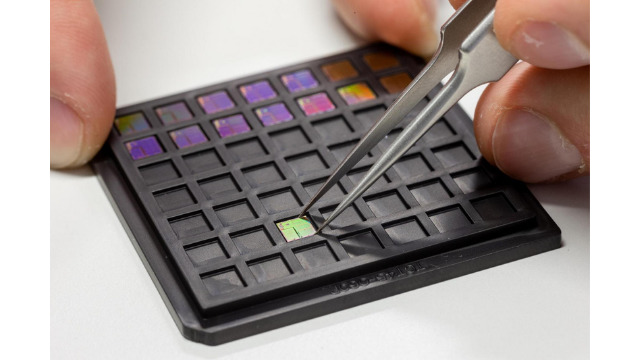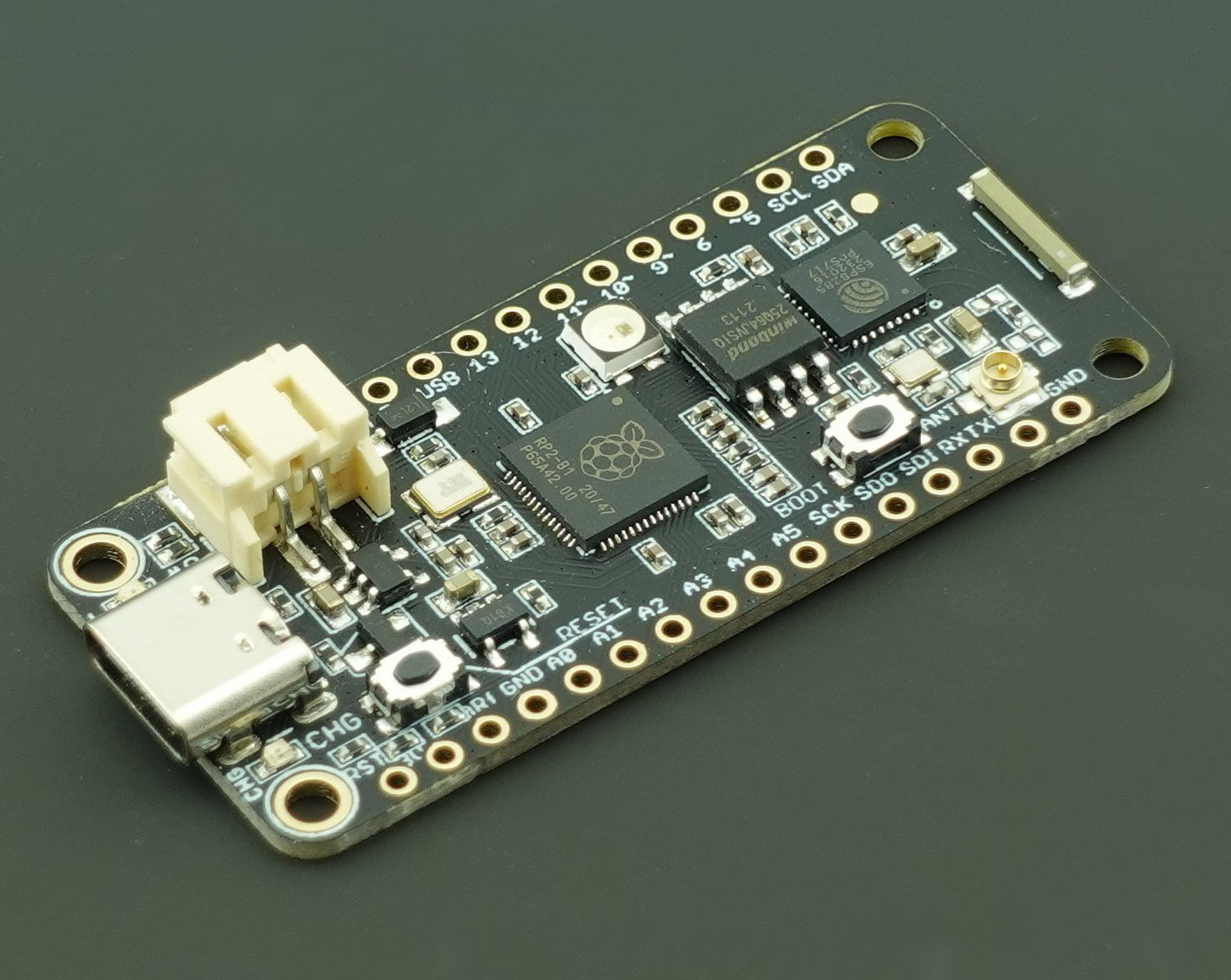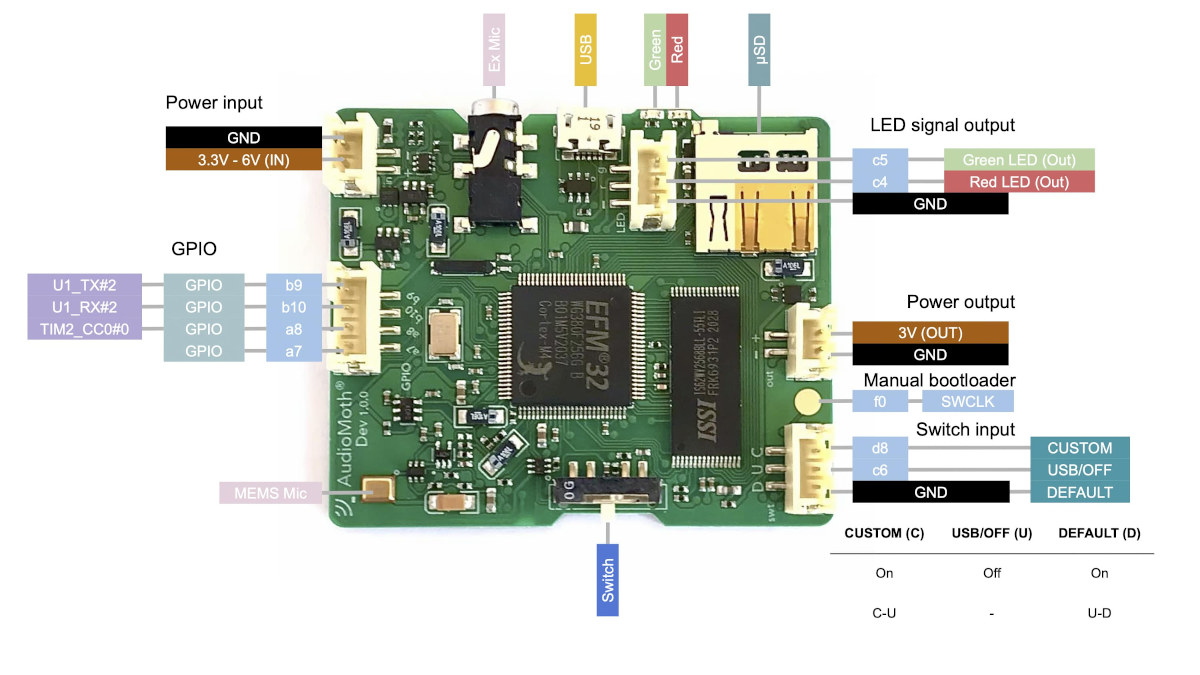I’ve just been notified about an inexpensive board (HLK-W806) based on WinnerMicro W806 32-bit XT804 (XuanTie E804) microcontroller clocked at up to 240 MHz and equipped with 1MB flash and 288KB RAM. XuanTie is the microcontroller family from Alibaba’s subsidiary T-Head Semiconductor, notably XuanTie RISC-V cores, but I’ve just learned not all XuanTie cores are based on the RISC-V architecture, and as we’ll see below, Xuantie E804 core appears to be based on the C-Sky architecture. It may still be interesting, as it’s in the STM32 board price range (pre-2020), but with a much higher frequency, so let’s have a look. HLK-W806 development board specifications: MCU – WinnerMicro W806 32-bit XT804 microcontroller @ 240 MHz with 1MB Flash, 288KB RAM, FPU, DSP, crtypto engine Expansion – 2x 24-pin headers with (based on MCU specs) 1x SDIO host with support for SDIO 2.0, SDHC, MMC 4.2 1x SDIO device up to […]
Giveaway Week – Maker Pi Pico board
If you have not played with Raspberry Pi Pico board, here’s an opportunity, as the third prize of our giveaway week is the Maker Pi Pico board fitted with the Raspberry Pi RP2040 MCU board, and providing easy access to I/Os with headers and Grove connector, plus a buzzer, an audio jack, and a MicroSD card socket for people needing storage. I reviewed the Maker Pi Pico board with CircuitPython, and it was more convenient than the bare Raspberry Pi Pico thanks to the reset button and an LED is assigned for each I/O. You could also add an ESP-01 module for WiFi connectivity since there’s an 8-pin header for that purpose. The CNXSoft signature on the back of the board clearly brings infinite value to the board. It’s just like an NFT, except it’s real ;). If you don’t think so, you could always use some alcohol to wipe […]
Nicla Sense ME – Arduino PRO meets Bosch SensorTech’s motion and environmental sensors
Arduino is going full steam ahead with its Arduino PRO family of boards for industrial applications. After the announcement of the Portenta H7 Lite board earlier this month, the company has now introduced the Arduino Nicla Sense ME designed in collaboration with Bosch Sensortec. The Nicla Sense ME (Motion & Environment) board comes with a range of Bosch Sensortec sensors notably a 9DoF smart motion sensor and a 4DoF environmental sensor with AI capabilities, and targets industrial IoT applications either for research projects, rapid prototyping, or commercial products. Arduino Nicla Sense ME specifications: MCU – Nordic Semi nRF52832 Cortex-M4 microcontroller @ 64 MHz with 512KB Flash, 64KB RAM, Bluetooth 4.2/5.0 LE connectivity (via U-blox ANNA B112 module) Storage – 2MB SPI flash for storage; 2MB QSPI dedicated for BHI260AP Sensors BHI260AP motion sensor system with integrated AI, “Fuser 2” 32-bit Synopsys DesignWare ARC EM4 core with RISC FPU BMM150 magnetometer […]
Arm PSA Certified Level 3 Sub-GHz wireless SoCs support Amazon Sidewalk, mioty, Wireless M-Bus, Z-Wave…
Silicon Labs has announced two new sub-GHz wireless SoCs with EFR32FG23 (FG23) and EFR32ZG23 (ZG23) devices adding to the company’s Gecko Series 2 Cortex-M33 platform. Both FG23 and ZG23 support up to one mile (~1.6 km) wireless range, 10+ year battery life on a coin-cell battery, are certified with Arm PSA Level 3 security, and support “advanced wireless technologies” such as Amazon Sidewalk, mioty, Wireless M-Bus (WM-Bus), Z-Wave, and proprietary IoT networks. Silicon Labs explains the chips’ ultra-low transmit and receive radio power (13.2 mA TX at 10 dBm, 4.2 mA RX at 920 MHz) and RF implementation (+20 dBm output power and -125.3 dBm RX at 868 MHz, 2.4 kbps GFSK), makes the long-range and long battery life possible. The ZG23 is designed for Z-Wave applications with Long Range and Mesh connectivity and can be integrated into either end devices or gateways. The company is also working on ZG23-based […]
Mikron MIK32 – Made in Russia 32-bit RISC-V MCU offers features similar to STM32L0 MCU
The Mikron MIK32 is a 32-bit RISC-V microcontroller made in Russia with features similar to an STMicro STM32L0 Cortex-M0+ MCU that shows how RISC-V open-source architecture can help lower the barrier to entry, and let more companies design their own chips. The MIK32 microcontroller features CPU IP from Syntacore based in Saint Petersburg following the RV32IMC profile. Clocked at 32 MHz, the MCU comes with I2C, UART, SPI, ADC, DAC interfaces, as well as various timers, an interrupt controller, and more. Mikron MIK32 specifications: CPU Core – 32-bit RISC-V up to 32 MHz with 32 registers, embedded multiplier, debugger (TAP controller and JTAG interface), and interrupt controller Memory & Storage – 256 bytes OTP ROM, 16KB RAM, 8KB EEPROM Interfaces Storage I/F – SPI, Dual-SPI, Quad-SPI interfaces for NOR and NAND flash devices 4-channel DMA controller supporting low-power modes 2x I2C, 2x UART with synchronous mode support, 2x SPI 12-bit […]
Ultra-Low-Power RISC-V System-on-Chip features Adaptive Body Biasing Technology
CSEM and USJC together have developed an ultra-low-power RISC-V chip for electronic gadgets such as wearables. The semiconductor companies, from Switzerland and Japan respectively, have been in the market for a while, developing technologies for low-power chips. Their latest collaboration uses Adaptive Body Biasing (ABB) and Deeply Depleted Channel (DDC) to build an ultra-low-power RISC-V chip with all the required and necessary components. Originating from the labs of CSEM, the Adaptive Body Biasing dwells into the operating efficiency of all the modes of ON, Standby, and OFF. There has been the problem of power leakage in Standby and OFF operating modes, but the Adaptive Body Biasing technology helps design to minimize power leakage when the processor is not operating while keeping the best performance in ON mode. For most of the designs, the processor is in Standby mode waiting for the incoming data or the next event to be offered. […]
Challenger RP2040 WiFi board marries ESP8285 with Raspberry Pi RP2040
We’ve already seen Raspberry Pi RP2040 getting WiFi connectivity with boards like Pico Wireless Pack, Wio RP2040 mini, and Arduino Nano RP2040 Connect in ways that do not always make technical and commercial sense as in many cases, the WiFi microcontroller (e.g. ESP32) is more powerful than the Raspberry Pi microcontroller. But Invector Labs’ Challenger RP2040 WiFi board does make more sense, as the company combines Raspberry Pi RP2040 dual-core Cortex-M0+ MCU with an entry-level ESP8285 WiFi microcontroller, and also offers LiPo battery support, all that in the Adafruit Feather form factor. Challenger RP2040 WiFi board specifications: Main microcontroller – Raspberry Pi RP2040 dual-core Cortex-M0+ MCU @ 133MHz with 264KB SRAM Storage – 8MB flash Network microcontroller – Espressif ESP8285 2.4GHz WiFi 4 SoC with 1MB on-chip flash pre-flashed with Espressif’s AT command interpreter, connected to the main MCU over UART at up to 921600 bps; I/Os via Adafruit Feather […]
AudioMoth Dev is a full-spectrum acoustic development board based on SiLabs EFM32 MCU
AudioMoth is a low-cost, open-source acoustic monitoring device that can record uncompressed audio from 8000 up to 384,000 samples per second onto a microSD card. With sensitivity to audible sounds as well as ultrasonic frequency range, It is mostly used for monitoring wildlife including bats, cicadas, the rainforest, etc… The manufacturer, Open Acoustic Devices, is now offering the development board version with AudioMoth Dev, based on a Silicon Labs EFM32 Wonder Gecko MCU like the full device, for $79.99 + shipping on GrougGets. AudioMoth Dev board specifications: Wireless microcontroller – Silicon Labs EFM32 Wonder Gecko Cortex-M4F MCU @ 48MHz with 256kB Flash, 32kB RAM External RAM – 256kB SRAM Storage – MicroSD card slot Audio capture On-board analog MEMS microphone, sensitivity -38 dBV/Pa, 63 dBA SNR, 10Hz to 192kHz Sample rates up to 384kHz 3.5 mm jack socket for external electret condenser microphones (Note: the optional case not compatible when […]


